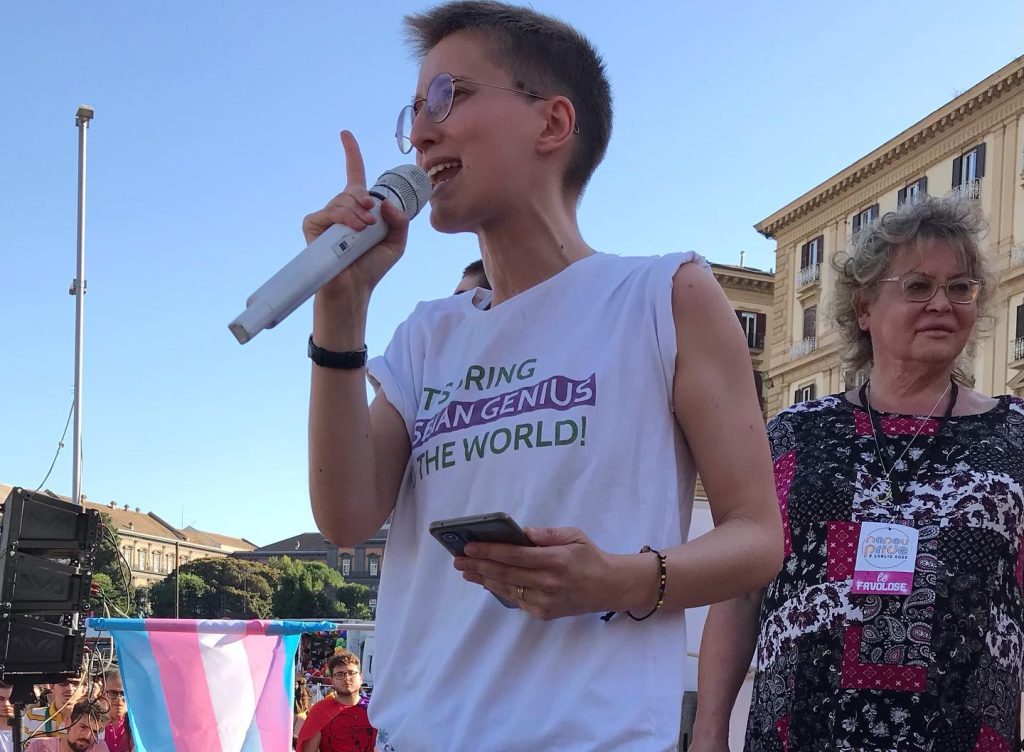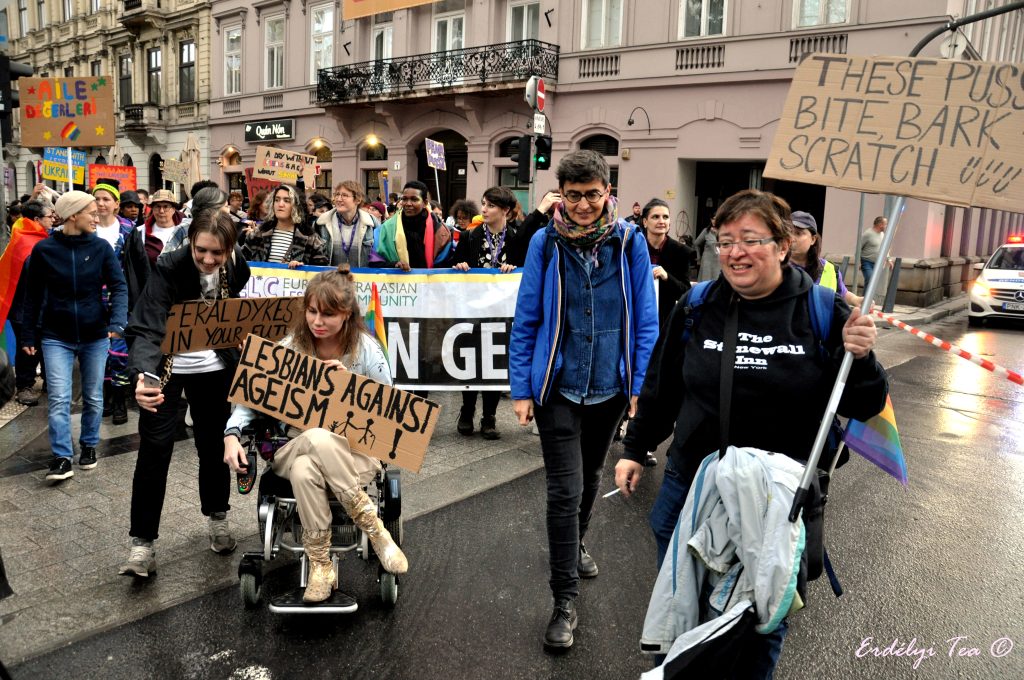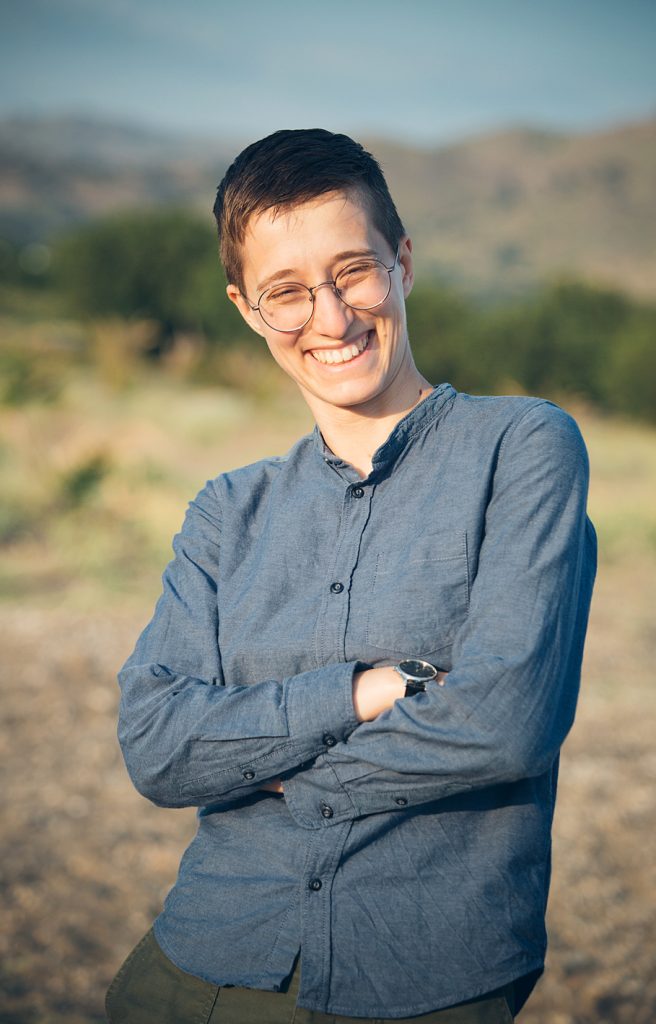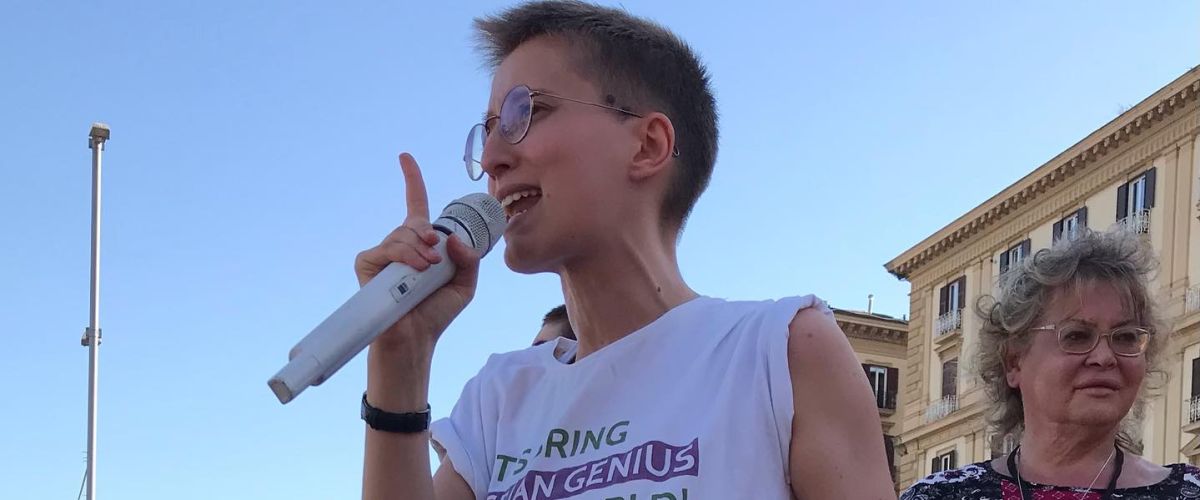Interview with Ilaria Todde
// Bjarndís Helga Tómasdóttir
TW: Discussion of violence and rape.
Lesbophobia is not a word in common usage, as we more often hear the word homophobia used to refer to prejudiced views against LGBTQIA+ people in general. As Advocacy and Research Director at EL*C, EuroCentralAsian Lesbian* Community, Ilaria Todde participated in two panels as part of the programme of IDAHOT+ Forum in Reykjavík in May of this year. EL*C is focused on combatting the issues that lesbians face today, issues that are rooted in homophobia and misogyny. As a panelist, Ilaria spoke of prejudice stemming from gender expression, lesbophobia and transphobia in particular.
What Is a Lesbian?
Before we go any further, it is worth mentioning that EL*C uses the word lesbian in a wider sense than we may be accustomed to in Iceland. On their website, the say that the usage of the word lesbian is “part of the political struggle for visibility, empowerment and representation” and that they use the word with an asterisk – lesbian* – “to include anyone who identifies as lesbian, feminist, bi, trans or queer, and all those who feel connected to lesbian activism.” Ilaria emphasises the importance of using the word, as it has negative connotations in many countries, having been seen as mainly a derogatory term. “It’s been used to sexualise, to fetishise the experience of LBQ women, and that’s why a lot of women who are non-heterosexual kind of don’t want to use it, don’t want to be associated with that,” she says. Lesbian porn, for example, is a very popular category online, but those that have engaged in lesbian sex will most likely agree that it is in no way representative of lesbians’ real-life sexual practices, being merely a fantasy tailor-made for straight men, who are the target audience for porn featuring queer women. For this reason, the women in this kind of porn are typically cast to appeal to the sensibilities of straight men, upholding ideals of what is considered traditionally attractive, in regards to being femme or feminine.
As such, the ideology of EL*C allows for using the word lesbian in various ways: it can both function as an identity label and a term for a large group of queer women or people that are treated as women. “We don’t want to oblige people to define themselves as lesbian. I don’t think the idea is to exclude people, it’s more about recognising that as women in this society we have a position that is influenced both by our sexual orientation and our gender,” Ilaria says. In this way, lesbian is a unifying concept, instead of being a term of isolation or exclusion. Using the word in this sense, makes it possible for queer women and people treated as women, cis or trans, to unite against the intersectional discrimination and prejudice that they face on the basis of their sex, gender expression and sexuality. The variables are, however, complex and it is important to be aware of this. For instance, bisexual women face prejudice both from the outside and the inside of the LGBTQIA+ community. Additionally, trans lesbians must face transphobia and a black lesbian faces lesbophobia as well as racial prejudice, to name but a few factors.

Then What Is Lesbophobia?
Ilaria explains that lesbophobia is a concept that covers compound discrimination on the basis of homophobia and misogyny, being not only related to sexuality but also gender and gender expression. “Lesbophobia is an analysis of a situation that takes into account every aspect or as much as is possible of the lived realities of the people we are talking about. When we talk about homophobia, we mainly think about sexual orientation and so we may deduce that a person has been attacked because they are non-heterosexual. Of course this is often true and there are many cases where people have been attacked because of their sexual orientation. The problem is that if you are a woman who is also non-heterosexual, the type of discrimination you will suffer will nonetheless be influenced both by your gender and by your sexual orientation.”
According to Ilaria, one cannot disregard the fact that our society is structured in a way that subsumes the existence of women under that of men. “Being a lesbian or a bisexual woman, you break that rule and, as a consequence of breaking that rule, you are punished by society with discrimination, either in the form of insults or, in extreme cases, physical attacks.” Ilaria mentions that in the most severe cases this may involve so-called “corrective rape”, where a man rapes a woman, or a person seen as a woman, with the aim of “curing” them of their homosexuality, as well as inflicting humiliation and punishment. This type of sexual violence is perpetrated in many places and one may even find examples of women who have been raped in Iceland because of their sexuality or gender expression. It is then most imporant to face this reality with a strong countenance, in order to enact change for the better. By talking about lesbophobia, Ilaria also says that we are taking real steps to better understand and counteract the kind of violence that is inflicted upon queer women and people treated as women.
Masc, Butch or Mascrona
Ilaria speaks at length about how being femme-presenting impacts the life of people who identify as women or are treated as women, as it pertains to discrimination. Ilaria herself is a cis woman that is decidedly masc-presenting. At the IDAHOT+ Forum, Ilaria talked about the way women like her, or people treated as women, experience the world, being masc-presenting. Coming from an island off the coast of Italy, Ilaria came out as a lesbian relatively early. “I almost have the impression that I have been preparing for this kind of forum for my whole life. I am quite masculine-presenting and come from a rural place in Sardinia. However, my experience is that I was not targeted as a teenager because I was a lesbian but more so because I was what in Sardinia we call a mascrona, which roughly translates as a female/male. A woman who behaves like a man is the worst thing a woman can be”
Simply by existing, Ilaria defies the conventional ideas of society regarding the gender binary, as she is sometimes treated as a woman and sometimes as a man, but this has sometimes been difficult to deal with, especially when she was younger. “It was very hard to reclaim this identity of being a mascrona. I am a mascrona! I am a butch and I believe my butchness also helps me better understand this idea of masculinity.” Referring to Jacke Halberstam’s book, Female Masculinity (1998), Ilaria says that having masculinity is not linked with being biologically male. “Embracing masculinity allows us – us meaning the lesbians, the trans men, the non-binary people – allows us to really think about how toxic masculinity is constructed in society and how it impacts the life of everyone in society, men included. So I really think there are opportunities there while it is also true that because of this revolutionary potential of these women, who are butch or masc-presenting, they are punished harshly by society. There is a general social injunction towards women that they should not look like a lesbian and what is actually being said is that you should not look masculine because women have to be feminine.”

Femme Women and Societal Pressure
“Gender expression is a factor that unites the whole LGBTQIA+ community. People are attacked because of their gender expression whether they are gay men who look too effeminate or a lesbian who looks too masculine. Trans people are also attacked because of their gender expression,” says Ilaria. The dangers are also very real for femme lesbians who may be targeted either on account of acting in opposition to traditional gender roles, such as by presenting in a non-conventional way, or on account of displaying traditionally feminine traits. “Women are not only violated when they go against the social norm, but also when they look feminine.”
The discrimination that femme lesbians face is also connected to the role of women within the patriarchy and the expectations that society places upon them, in particular when it comes to their relationships with men, traditional gender roles and childbearing. Society thus pressures women to confirm to ideals of femininity, reflecting the belief that femininity must be in service of men, as Ilaria says. “The idea is that we don’t exist in ourselves, but that we exist because of men, either for the pleasure of men or for being discarded by them, and the fact that we would rather affirm our existence destroys a lot of the expectations and ideas held by society. There is this idea that if a lesbian is very feminine-presenting or attractive by mainstream standards, she’s a waste and we should ask ourselves; a waste of what? If you look at this issue from a gendered perspective, the answer is evidently a waste of reproductive labor. We have a woman who looks like a woman and so she should do the things a woman does, namely produce children for the patriarchy.”
A Never-Ending Battle
Many Icelandic lesbians will doubtlessly identify with much of what Ilaria Todde has to say. Femme-presenting women are acutely aware of the risk of unwanted advances and sexual harassment by men whereas masc-presenting women have experienced backlash from society for existing proudly as they are. The LGBTQIA+ community at large knows the danger of prejudice, violence and discrimination and the necessity of keeping up the never-ending battle for equal rights, visibility and acceptance from society. Therefore, it is vitally important for us to stand together and face any opposition united in our ranks.
On the other hand, this sense of unity must not preclude us from taking a closer look at specific issues faced by the subgroups of our community. To be sure, we know better than anyone that we don’t have to be exactly the same and we don’t have to understand every single detail of each other’s struggle to support one another. Rather we might say that it is essential that we realise that there are some things that separate us while we choose to let these issues bring us closer together in our common fight.

First published in the Reykjavik Pride magazine 2023.
